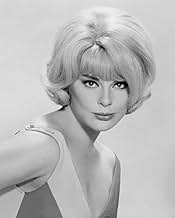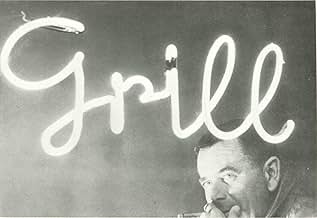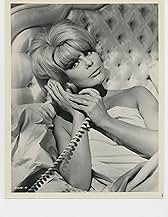NOTE IMDb
6,2/10
949
MA NOTE
Ajouter une intrigue dans votre langueWhen half-a-million dollars disappears from a doctor office's safe, the cops assigned to the burglary case, Joe and Pete, decide to find the money and keep it for themselves.When half-a-million dollars disappears from a doctor office's safe, the cops assigned to the burglary case, Joe and Pete, decide to find the money and keep it for themselves.When half-a-million dollars disappears from a doctor office's safe, the cops assigned to the burglary case, Joe and Pete, decide to find the money and keep it for themselves.
- Réalisation
- Scénario
- Casting principal
Parley Baer
- Banker
- (scènes coupées)
Stacy Harris
- Drunken Man
- (scènes coupées)
Bill McLean
- Delivery Man
- (scènes coupées)
Don Anderson
- Waiter at Party
- (non crédité)
Robert Anderson
- Police Inspector
- (non crédité)
Herman Boden
- Parking Lot Attendant
- (non crédité)
William Campbell
- Jack Archer
- (non crédité)
Avis à la une
The Money Trap for me has the distinction of being one of the last B features I ever saw on the big screen as part of a double bill. It is a film way past its prime as a noir picture.
Noir as a genre essentially died little by little as more televisions were in American homes. The kind of stories that noir does best were now being shown on television every night. Movies were getting bigger and splashier to compete with TV and films like the Money Trap were just not being made for theaters any more. Watching it yesterday on TCM, I was struck by the ludicrousness of a letter box version for a black and white noir.
By the way, in 1965 television was about to go full color and black and white feature films were getting rarer each year.
But even as a noir film, The Money Trap has no people you really care about. Glenn Ford is married to a wealthy woman and lives in a lifestyle beyond his cop's salary. But then wife Elke Sommer gets a letter saying her late Daddy's stock won't be paying any dividends. Well golly gee, we should all have such problems.
It never occurs to Glenn Ford to tell Elke to tone down her extravagant ways, maybe even move out of that luxurious home they have to something more modest. Ford's kind of into the good life also.
During a homicide investigation involving a wealthy doctor played by Joseph Cotten who allegedly surprised a burglar in his home, Ford and partner Ricardo Montalban suspect something dicey. Before expiring in the ambulance, the burglar gives Ford the safe combination.
Now knowing something is amiss here. Ford and Montalban decide on a robbery. Of course the doctor is smarter than the both of them put together. The whole thing ends in one bloody mess and the viewer doesn't really care.
A few years later The Money Trap would have been strictly a made for TV feature if it got made at all. Probably MGM was busy trying to get rid of long time contractual obligations to Ford and Montalban. Both of them have sure done better work.
But the saddest thing of all is that this is the last feature film partnership of Glenn Ford and Rita Hayworth. Rita's the best thing in this film, playing a very worn out forty something ex-girlfriend of Ford's and widow of the burglar Cotten shot. A great acting job and not anything a former reigning sex goddess ever did before.
But it ain't enough to save The Money Trap.
Noir as a genre essentially died little by little as more televisions were in American homes. The kind of stories that noir does best were now being shown on television every night. Movies were getting bigger and splashier to compete with TV and films like the Money Trap were just not being made for theaters any more. Watching it yesterday on TCM, I was struck by the ludicrousness of a letter box version for a black and white noir.
By the way, in 1965 television was about to go full color and black and white feature films were getting rarer each year.
But even as a noir film, The Money Trap has no people you really care about. Glenn Ford is married to a wealthy woman and lives in a lifestyle beyond his cop's salary. But then wife Elke Sommer gets a letter saying her late Daddy's stock won't be paying any dividends. Well golly gee, we should all have such problems.
It never occurs to Glenn Ford to tell Elke to tone down her extravagant ways, maybe even move out of that luxurious home they have to something more modest. Ford's kind of into the good life also.
During a homicide investigation involving a wealthy doctor played by Joseph Cotten who allegedly surprised a burglar in his home, Ford and partner Ricardo Montalban suspect something dicey. Before expiring in the ambulance, the burglar gives Ford the safe combination.
Now knowing something is amiss here. Ford and Montalban decide on a robbery. Of course the doctor is smarter than the both of them put together. The whole thing ends in one bloody mess and the viewer doesn't really care.
A few years later The Money Trap would have been strictly a made for TV feature if it got made at all. Probably MGM was busy trying to get rid of long time contractual obligations to Ford and Montalban. Both of them have sure done better work.
But the saddest thing of all is that this is the last feature film partnership of Glenn Ford and Rita Hayworth. Rita's the best thing in this film, playing a very worn out forty something ex-girlfriend of Ford's and widow of the burglar Cotten shot. A great acting job and not anything a former reigning sex goddess ever did before.
But it ain't enough to save The Money Trap.
The noir cycle had run its course by the early 60s, but a few stragglers made it through the gates before the 70s changed the way movies were made and viewed. The Money Trap is one of them, and could have been made, in terms of technique and sensibility, in 1956 rather than a decade later. (Digression: this was a time when a series of European "bombshells," most of whom seem to have learned their lines phonetically, starred in big-budget movies, in Hollywood's dizzy anticipation of multiculturalism. Here we have to endure Elke Sommer whose eyes all but cross in her attempt to pronounce English). The theme is the rot at the core of the American Dream (Norman Mailer's novel of that title appeared in 1966, too). Glenn Ford plays a police detective goaded by Sommer to a higher standard of living than his salary permits. He allows himself to be lured into the company of some very shady characters, chief among whom is Joseph Cotten, and starts his descent down the primrose path. Best part of the movie is the return of Rita Hayworth (Ford and she first paired, unforgettably, in Gilda 20 years earlier), as a blowsy waitress with whom Ford once.... Well, you get the picture. When he asks her how she's been, she grudgingly responds, "I've been around."
Except for the music, THE MONEY TRAP is strictly by the numbers. Third billed Rita Hayworth has maybe five minutes screen time. No matter, she bring what little class this movie has to the screen. My big question is, what is such a terrific cast DOING in this insipid junk? Drawing a paycheck, I guess. Certainly, Glenn Ford, Ricardo Montalban and Joseph Cotton (all then under contract to MGM) were strictly drawing paychecks. This movie SHOULD be seen a reminder of sexual attitudes to which we should NEVER return. That is, whatever males do is OK, but woe be on to a female whom "transgresses," PARTICULARLY if she enjoys it! Otherwise, don't waste your time.
The cast and quality black-and-white camera work would seem to destine this film for something great but we don't get there. The problem seems to be the storyline/script which is just too familiar and predictable. Glen Ford plays a fairly well-to-do cop who feels pressured by his barbie doll young wife, Elke Sommer, to deliver even more affluence. His partner, Montalban, is more directly avaricious. Cotten is a corrupt doctor and a very used looking Rita Hayworth is Ford's ex-girlfriend from years ago.
Ford as usual, underplays but nevertheless makes you feel the cold emptiness and disillusionment of the character. Everyone else delivers well but I think we have all seen these characters, motivations and situations a hundred times before and the script does not give any room for interesting angles or surprises. We get a very dark (literally and figuratively) and gritty film but not something that is likely to grow on you. If this had been made in 1932, it would have been a far more significant film. By the mid 60s, it was tired formula.
Ford as usual, underplays but nevertheless makes you feel the cold emptiness and disillusionment of the character. Everyone else delivers well but I think we have all seen these characters, motivations and situations a hundred times before and the script does not give any room for interesting angles or surprises. We get a very dark (literally and figuratively) and gritty film but not something that is likely to grow on you. If this had been made in 1932, it would have been a far more significant film. By the mid 60s, it was tired formula.
Was the world ever really like this?
Pure 1965 black and white, this time machine of a crime drama takes you back to when Elkie Sommer was young, and Joseph Cotten was'nt dead. No profanity, blood or sex on the screen, but everywhere in the painlessly stereotypical screenplay. Predictable to a fault, you seem not to care it's all one big cleche. The jazzy, pre-groovy background music, a totally orignal score by Hal Schaffer, makes this crime-like thing a nostalgic romp of flat-foot flick.
Pure 1965 black and white, this time machine of a crime drama takes you back to when Elkie Sommer was young, and Joseph Cotten was'nt dead. No profanity, blood or sex on the screen, but everywhere in the painlessly stereotypical screenplay. Predictable to a fault, you seem not to care it's all one big cleche. The jazzy, pre-groovy background music, a totally orignal score by Hal Schaffer, makes this crime-like thing a nostalgic romp of flat-foot flick.
Le saviez-vous
- AnecdotesThis was the last of five films which Glenn Ford and Rita Hayworth made together. It was a sign of the times that, whereas Hayworth had always been top-billed over Ford in their earlier films, for this film she was third-billed behind Ford and relative newcomer Elke Sommer.
- ConnexionsEdited from Le grand sommeil (1946)
Meilleurs choix
Connectez-vous pour évaluer et suivre la liste de favoris afin de recevoir des recommandations personnalisées
- How long is The Money Trap?Alimenté par Alexa
Détails
- Date de sortie
- Pays d’origine
- Langue
- Aussi connu sous le nom de
- The Money Trap
- Lieux de tournage
- Société de production
- Voir plus de crédits d'entreprise sur IMDbPro
- Durée1 heure 31 minutes
- Couleur
- Rapport de forme
- 2.35 : 1
Contribuer à cette page
Suggérer une modification ou ajouter du contenu manquant

Lacune principale
By what name was Piège au grisbi (1965) officially released in India in English?
Répondre




































